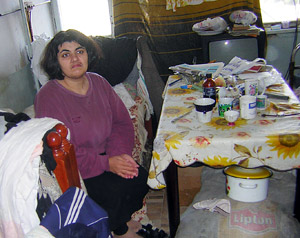She invites me in. The smell is horrible. There is someone laying on the bed motionless and looks like he is on the verge of dying. I get the impression that that person is dead. I ask: “Who is this man? Is he dead?” Alina says: “That’s my dad, he’s no dead, but…” But he is on the verge of dying. There is nothing humane in that room.
Alina is 33 years old and lives with her parents. Her father Roman Mkrtchyan got a heart attack after leaving Baku for Armenia with his family.
“He was hard-working, he raised us well. When we came to Armenia, he couldn’t’ find a job, we were starving to death, we wouldn’t eat bread for days. He was feeling cold, he couldn’t stand it and got a heart attack,” says Alina who currently takes pills. Alina wants to talk about her dad.
“Roman Mkrtchyan had a good job and…,” she starts, but Roman’s cry interrupts her. As he hears what his daughter is saying, he starts to cry out loud and holds his head with his two hands, hitting himself on the wall. I look at Roman Mkrtchyan astounded.
“Don’t be scared, he’s jut not feeling well, he cries, then relaxes, he’s a sick man. If you’re afraid, you can leave; we’re used to it, we won’t be offended. He can’t stand, so, there is no danger.” I ask: “How do you take care of a sick patient like him? Have you taken him to the hospital…?” Alina wants to answer to that question, but starts to mutter, as if she can’t find the words to respond. This family lives on 22,000 drams, which is the total amount of the pension of three people and the family subsidy. Alina says:
“We have been living in this room since 1998. You’ve only been here for five minute and already want to leave. Our situation is bad, we’re all going insane, we can’t resist the hardships.” She says that the committee for “taking care” of refugees, as well as other benevolent organizations, has never been interested in them. I ask: “What do you eat?” Alina says: “Mother Anna goes to the benevolent cafeteria, eats something and brings something for dad. He’s sick, he has to eat low-cholesterol bread, but she brings whatever she can, so he won’t starve, he can’t take it anymore.” The door opens and the residents of the building come in. “Thank God someone came to see us. Have you seen something like this, my dear? How can they treat people like this? They brought them here and left them without food or heating. I understand that they’re refugees, but don’t the authorities spending 1000 dollars in restaurants understand that they just can’t kill people like that? Are they to blame for being in this situation? She’s a 33-year old woman, but she held on, she got psychologically ill, her father went through a heart attack and stayed in bed. What is this? How can they play with people’s destinies?” say the neighbors and say that the authorities should be ashamed of themselves. Alina’s neighbors say that their mother, Mrs. Anna, is on the verge of dying. “If you see that woman, you’ll cry with a sense of remorse, too bad that she’s in Vernisage now and you can’t see with your own two eyes. The poor woman can’t find a way to help these people.” I ask: “What’s Anna doing at the Vernisage?” They say: “She tries to find scraps in garbage cans every day. She finds bread, brings it home and they eat. She brings old clothes, rags, washes them and they wear them so that they won’t get cold. Sometimes Anna finds useful items in the trash, washes it and sells it at the Vernisage.”
Alina looks at her neighbors with hatred because she doesn’t’ want them to talk about her mother; she feels bad that she’s 33-years old and can’t help her mother out. She feels guilty. Alina takes care of her dad, however everyone in that house needs to be taken care of. The neighbors keep complaining about the bad situation of this family, but I can no longer hear them because I’m dying from the smell in the room. “Do you have a h heartache, my dear? Come, come let’s talk outside, you can’t imagine what they go through…” say the neighbors as they bring me outside and say more bad things about Roman’s family. My head is spinning, I leave speechless, I don’t want to listen to them because perhaps our authorities are right by not visiting Roman Mkrtchyan’s house. Their lives are easy, they don’t feel remorse, spending thousands of dollars and not know that there are people in Armenia who are going insane from hunger and the cold. It’s hard to continuously hear the cry of Roman; Armenian authorities need to rest, so they can be able to concentrate and think of new plans for overcoming poverty, give lectures, come up with brilliant ideas, but really do nothing.

